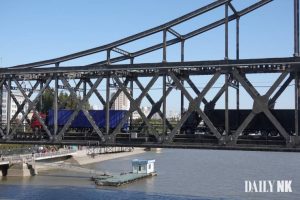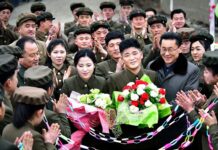While North Korea has been making moves to reopen trade with China, it appears hesitant to lift the border blockade between the two countries. A Daily NK source recently reported that the authorities have been ferreting out and punishing traders involved in smuggling. This crackdown could be an attempt to encourage trade workers to be cautious until the authorities open the border.
“From the beginning of this month until recently, the authorities have been arresting anyone who engaged in smuggling and those who did not submit their ‘loyalty fees’ to the party on time. [The authorities] have exiled some of them to remote areas, or sentenced them to re-education through labor or even death,” a source in North Pyongan Province said on May 18. “They are being punished because they misappropriated trade profits for their own personal gain and not for the benefit of the country.”
The hunt for those who participated in or abetted smuggling and those who failed to pay party “loyalty fees” reportedly came to a close in late April. North Korean authorities also investigated traders and firms applying for new waku (trade certificates) during the same period.
North Korean authorities accepted new waku applications from Apr. 12 and Apr. 14. After receiving the applications, the Central Committee’s Department of Economic Affairs, the Ministry of Foreign Trade, and the Ministry of State Security began screening them.
“Twenty people ended up being targeted for punishment,” the source said. “[The authorities] arrested all of them at the same time and their punishments were meted out immediately.”

The majority of the 20 trade workers sentenced to punishment were involved in official state trade or carried out their own personal smuggling endeavors through official trade networks. The authorities accused them of selling minerals, including iron ore and gold, to China in Nampo, Cholsan, Ryongampo, and Chongju.
In addition, some of the traders received punishments because they had simply failed to pay “loyalty fees” to the party.
One of the traders was caught in the Yellow Sea near Zhuanghe, a city in China’s Liaoning Province. The individual was attempting to cross into China to sell a large volume of high-end North Korean cigarettes.
Trade workers who had participated in state-authorized trade but who had failed to pay their “loyalty fees” received sentences of re-education through labor or deportation to undesirable areas. Those who the authorities confirmed had participated in smuggling, however, received harsher sentences, including execution.
The authorities appear to have moved to arrest and punish the smugglers under the assumption that smuggling will flourish once full-fledged Sino-North Korean trade resumes.
There was speculation that North Korea would finish issuing waku and resume trade with China earlier this month. However, it appears that the authorities are not proactively moving to open up the border.
New waku will likely be issued by around May 20. Multiple sources in North Korea have predicted, however, that even after traders receive their waku, they will not be able to immediately engage in trade activities.
All this suggests that North Korean authorities are proceeding with considerable caution in their efforts to open the border and resume trade. State officials will also likely continue to exert strong controls over trade and meticulously inspect imported goods.
North Korean officials are likely to accept the import of permitted goods as long as they go through an inspection process. However, it may take longer for the country to begin exporting goods even after issuing waku and partially resuming trade.
“Things that the government needs like agriculture-related goods and construction materials are on the list of permitted import items. However, consumer goods like soybean oil and flavor enhancers, for which there are already substitutes being sold in markets, have not received priority status,” the source said. “Depending on [the government’s] assessment of the COVID-19 situation, the resumption of trade could get pushed back even further.”
*Translated by S & J


















